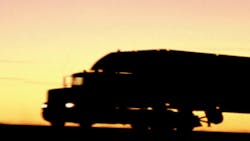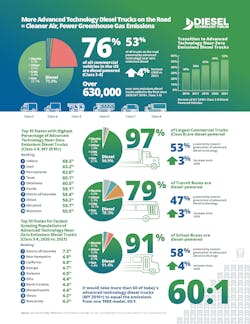New emissions rules take effect in California
In the wake of stricter smog rules from the EPA, the California Air Resources Board Truck and Bus Fleet Regulation January 1 deadline recently passed that requires almost all trucks and buses to have 2010 or newer model year engines. Vehicles not in compliance may not be registered in the state.
According to the Diesel Technology Forum analysis, 76% of the nation's 15 million Classes 3-8 commercial trucks run on diesel, with 53% using the newest generation of advanced diesel technology. The next largest is gasoline at 23%. Electric accounts for about 1%.
California comprises nearly one-third of that 1% share, though for every electric truck in the Golden State, there are 300 diesel trucks.
DTF Executive Director Allen Schaeffer noted that "[i]n 2021, California was the sixth fastest-growing state for registrations of these new technology trucks, adding nearly 30,000 new units since 2020, likely in anticipation of this new rule taking effect."
He added that, as of Dec. 2021, "48% of all commercial diesel vehicles in California were 2011 and newer vehicles."
Overall, Schaeffer noted: "As a result of managers updating their fleets to meet the new rule, the Diesel Technology Forum reported that trucks nationwide have saved 20 billion gallons of fuel since 2011, preventing 202 million metric tons of Greenhouse Gas emissions and 27 million metric tons of NOx emissions.
See also: As emissions requirements sunset, California wants zero-emissions drayage by 2035
"The technology, standard in commercial trucks on the road since 2011 and farm and construction equipment since 2014, has achieved more than 98% reduction in nitrogen oxides (NOx) and particulate matter (PM)," Schaeffer explained.
The commercial vehicle industry is making these strides as California continues to tighten its environmental regulations, aided by programs and financial assistance for smaller fleets to remain in compliance. Among those programs include The Heavy-Duty Vehicle Air Quality Loan Program, also known as the California Capital Access Program (CalCAP) CARB Truck Loan Assistance Program, which provided extra credit to businesses who updated their vehicles to meet the 2010 requirement. From 2009 to 2022, CARB contributed $219 million to the program to assist small fleets.
"The new generation of advanced diesel technology vehicles now serving California’s trucking fleet will continue to be a key aspect of California’s clean air and climate strategy, even as it moves toward zero-emission technology in the future," Schaeffer concluded.

